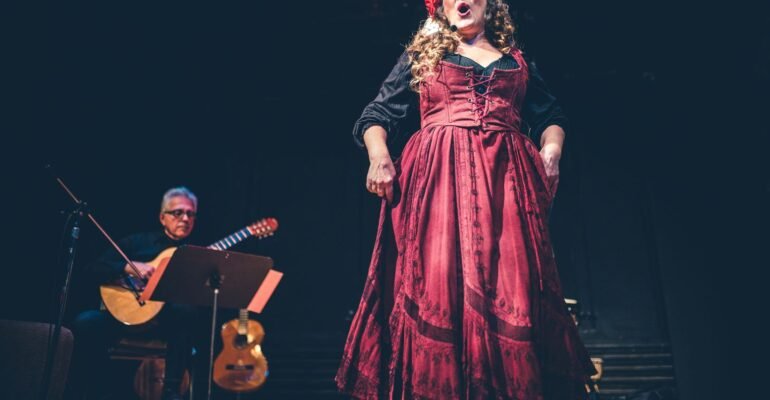16 Magical steps ! How to learn Opera Singing in India
October 27, 2023 2024-06-19 9:5916 Magical steps ! How to learn Opera Singing in India

16 Magical steps ! How to learn Opera Singing in India
How to Learn Opera Singing in India
Are you passionate about singing and intrigued by the powerful and emotive world of opera? Learning to sing opera can be a challenging yet immensely rewarding journey. If you’re eager to embark on this melodious adventure, you’re in the right place. In this beginner’s guide, we’ll explore the enchanting world of opera and discuss how to learn opera singing. Whether you’re a complete novice or already have some vocal experience, we’ll help you find your voice and dive into this rich and passionate art form.

16 Magical Chapters Of How to Learn Opera Singing in Indian :-
Chapter 1: Understanding Opera Singing
Before you start your journey, it’s essential to understand the basics of opera singing. Opera is a form of musical theater that combines powerful singing with dramatic storytelling. Opera singers use their voices to convey emotion and tell a story. Here are some key terms you’ll need to know:
-
- Aria: A solo piece that showcases a singer’s vocal skills and emotions.
-
- Libretto: The text or script of an opera.
-
- Vocal Range: The span of notes a singer can comfortably sing.
-
- Vibrato: A pulsating variation in pitch used for expressive purposes.
Chapter 2: Find a Knowledgeable Teacher
Learn opera singing in india is not something you can master on your own. It’s crucial to find a knowledgeable teacher or vocal coach who can guide you. Look for a teacher who specializes in opera and has experience in the genre. They will help you understand the technical aspects of opera singing, such as breath control, vocal range, and projection.
Chapter 3: Vocal Technique
Opera singing requires a solid vocal technique. Here are some key elements to focus on:
-
- Breath Control: Learning to control your breath is essential for singing opera. Proper breathing techniques will help you sustain long, powerful notes.
-
- Vocal Warm-ups: Warm-up exercises are crucial to prepare your voice for singing. Your teacher will guide you through exercises that improve your vocal flexibility and strength.
- Diction and Pronunciation: Good diction and pronunciation are vital in opera. You must be able to convey the meaning of the words you’re singing clearly.
Chapter 4: Repertoire and Selection
Opera has a vast repertoire with a wide range of styles and vocal demands. Begin with simple arias and gradually work your way up to more complex pieces. Your teacher can help you select the right songs that match your vocal range and style preferences.
Chapter 5: Practice and Patience
Like any skill, learning opera singing requires dedication and patience. Regular practice is essential. Start with short practice sessions and gradually increase the time you spend on vocal exercises and singing. It’s a journey, so don’t be discouraged by initial challenges.
Chapter 6: Stage Presence
Opera isn’t just about the voice; it’s also about storytelling through movement and emotion. Work on your stage presence and expression to connect with your audience on a deeper level.
Chapter 7: Performance Opportunities
As you gain confidence and proficiency, seek out performance opportunities. Performing in front of an audience is a valuable experience that can help you grow as an opera singer.
Chapter 8: Learning Opera in India
For those of you in India, Angel’s Music Academy is the ideal place to learn opera singing. As India’s leading music college, they offer specialized opera singing courses and have a team of experienced instructors. With their guidance, you can develop your talent and passion for opera singing in a supportive and nurturing environment. They also run online 1-2-1 courses from Ama Online

Chapter 9: Vocal Health
Maintaining good vocal health is crucial for opera singers. Avoid straining your voice, and be mindful of your overall health. Stay hydrated, get enough rest, and avoid smoking and excessive caffeine intake, which can dry out your vocal cords. Consulting with a vocal health specialist can be beneficial for long-term voice care.
Chapter 10: Music Theory and Ear Training
Understanding music theory and developing your ear for pitch and melody can greatly enhance your opera singing. Familiarize yourself with key signatures, intervals, and scales. Ear training exercises can help you stay on pitch and recognize different musical elements within the opera.
Chapter 11: Language Skills
Many operas are sung in languages other than your native tongue. Therefore, it’s essential to work on language skills. Learn the basics of Italian, German, French, or any other languages frequently used in opera. This will help you understand and convey the emotions and story within the libretto accurately.
Chapter 12: Costume and Character Development
As you advance in your opera journey, you’ll delve into the world of character development. Understanding the character you’re portraying and the historical context of the opera can significantly improve your performance. Costumes and stage makeup are also essential elements of becoming a convincing opera performer.
Chapter 13: Auditions and Competitions
If you aspire to make a career out of opera singing, participating in auditions and competitions is a common way to gain recognition. Your teacher or coach can help you prepare for these events, which often include singing specific arias and showcasing your skills in front of judges.
Chapter 14: Collaborate with Musicians
Opera is a collaborative art form. Collaborating with other musicians, such as pianists, orchestras, and fellow singers, is an excellent way to refine your skills and gain experience. It’s essential to learn how to work harmoniously with other musicians and adapt to different performance settings.
Chapter 15: Record and Review Your Performances
Recording your practice sessions and performances is a valuable tool for self-assessment. You can listen to your recordings to identify areas for improvement, from vocal technique to stage presence. It’s an effective way to track your progress over time.
Chapter 16: Continue Learning
Opera is a lifelong journey. Even after you’ve achieved a certain level of expertise, it’s important to continue learning and refining your skills. Attend workshops, masterclasses, and seek feedback from experts in the field to keep growing as an opera singer.
Remember, opera singing is not just about mastering the technical aspects; it’s about connecting with your emotions and the audience to tell a compelling story through music. With dedication, guidance, and a passion for this art form, you can find your voice and flourish as an opera singer. And for those in India, Angel’s Music Academy is the perfect place to begin this incredible journey.
Related Posts
Women in Music
Music Technology
Techniques for Opera Singers
Different Roles in Opera
Search
Categories





